The Plant Health and Seeds Inspectorate (PHSI) is part of the Animal and Plant Health Agency (APHA) and is responsible for protecting the country and economy from the effects of plant pests and diseases.
In this blog Laura Chapman and Natalie Vallone tell us about the range of their work as Plant Health and Seed Inspectors.
There are many pests and diseases that could have a negative impact upon crops, plants, the landscape and ecosystem and my job as a plant health inspector is to protect all plants and trees in England and Wales – we are often called the ‘plant detectives’.
There are a number of plant pests and diseases called quarantine pests (not yet present in the EU) or regulated pests (present but not widely distributed). My role is to identify and control these pests and pathogens, to survey any new and emerging pests and diseases and to prevent their introduction and spread.
If a certain disease or pest was allowed to enter into the UK, it could have a devastating effect upon the landscape you see around you, or negatively impact a crop, such as potatoes, that you are used to seeing in supermarkets. A lot of people do not realise that some of the plants you see in garden centres are imported from Europe and we also inspect plants that have come in from further afield eg. Ethiopia and Kenya.
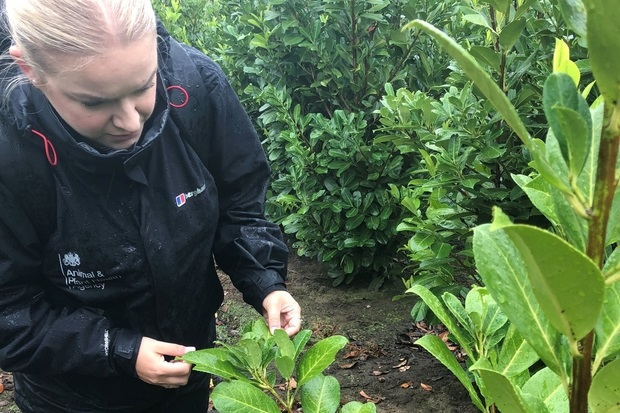
I visit various plant nurseries, garden centres, growers and other agricultural industries on a daily basis. I check their plants, trees and crops to prevent and control quarantine and regulated pests and diseases. If one of these pests or diseases is found, I am involved in organising emergency measures to control the outbreak.
There is, however, no real average day as unexpected tasks do transpire. For example, this week, I had to sample some growing media for export to Norway and previously to check it wasn’t contaminated, I have visited a bone china factory to assess the processes for export of bone china and clay to China and Malaysia! I also get called out to residential properties or businesses not involved in selling or trading plants; one man thought he had some diseased Prunus in his front garden, but it turned out to be caterpillar damage, and a school got in touch as they found numerous very hairy caterpillars, thought to be Oak Processionary Moth, a quarantine pest. I was able to reassure the school that these caterpillars were a native species.
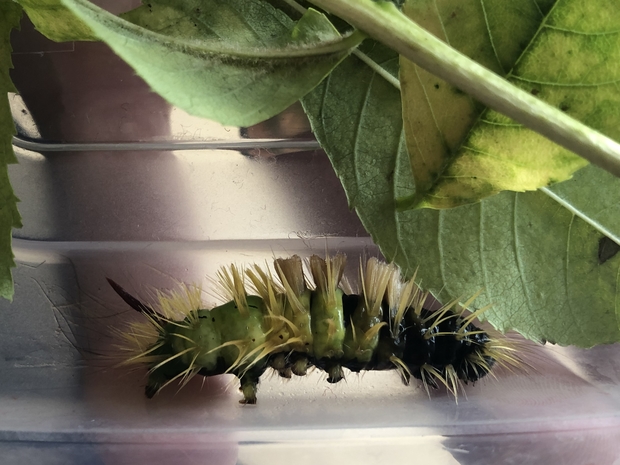
My job and work priorities change depending on the season, so I have to be very adaptable and willing to change my working week to meet the needs of the business. Even in the depths of winter, I undertake tasks such as soil sampling to test for potato cyst nematode (as shown in my photo below). This involves walking fields and collecting soil samples which are then sent to a laboratory for testing. Despite the snow and bad weather, nothing stops me from doing my job!
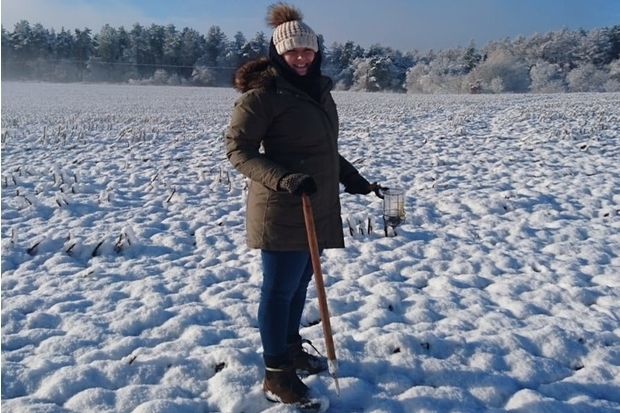
Some additional work we carry out as Plant Health and Seed Inspectors:
Seed Potato Classification Scheme
Each summer, Plant Health and Seeds Inspectors can be found working in potato fields around the country to take on the huge task of walking over 4,000 hectares of potato fields, as part of the Seed Potato Classification Scheme (SPCS) – this is the equivalent to the area of 4,000 international rugby union fields!
The scheme provides classification for all potatoes produced and marketed in England and Wales to provide assurance that seed potatoes have met specified health and quality standards. Classification is based on class of the parent seed, the health of the crop and tubers.
Whilst walking the field, we are assessing the health of the crop, ensuring it is true to the variety and checking that it is free from mixtures. We are looking for virus (a yellow leaf mottle), black leg (black rotting at the base of the stem) and rogue plants (these are plants possibly from a previous cropping variety – see photo below).
Inspectors from all over the country are pulled together each summer to spend many days walking fields in sunshine, wind and rain; it is also a great opportunity to catch up with colleagues. This work has continued using government guidelines through the COVID-19 restrictions as potatoes are an important crop in the UK.
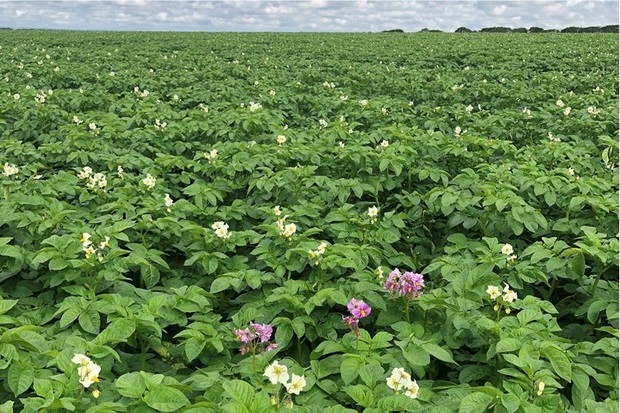
Crop Inspection
PHSI work with the National Institute of Agricultural Botany (NIAB) to provide crop inspection services for cereals, peas, beans and herbage as part of the Plant Varieties and Seeds Division (PVS) certification work in England. The PVS protects farmers and their customers by guaranteeing that all certified seeds meet prescribed standards for varietal identity and purity, germination and freedom from foreign material.
To become a licensed and official crop inspector, I had to attend NIAB for my official crop inspector training and have to undertake refresher course every 5 years; this includes passing exams.
When out visiting the crops to carry out my check inspections, I have to confirm the identity of the variety in the field, detecting and recording any varietal (a plant of the same species where one or more of its morphological characters is outside the range of characters normally associated with that variety) and species impurities.
There are isolation guidelines to follow, for example, Triticale (a hybrid of wheat and rye) crops need to be 20 or 50 meters apart; this is to ensure there is no cross-pollination from neighbouring crops. I am then looking at the general condition of the crop: is it in a suitable condition for inspection; is there any pesticide spray damage; are there any weed species, diseases and lodging?
Crop inspecting is definitely one of my favourite parts of my job in the summer, as I love being out in the countryside. Sometimes it can be a challenge on very hot days, and I have a tendency to attract insects and horse flies, so a high SPF, suitable clothing and a good insect repellent is needed!
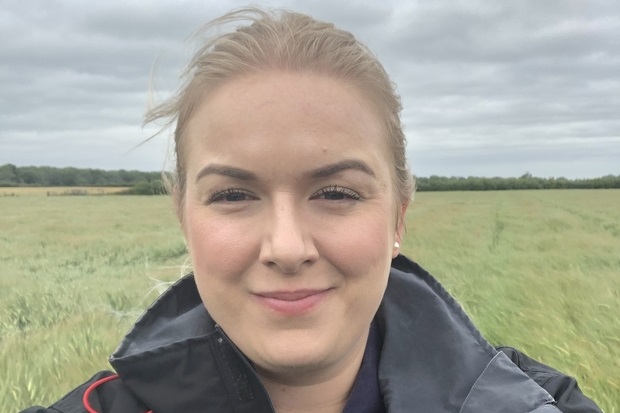

20 comments
Comment by Sue Patterson posted on
I found this a really informative and interesting blog to read. I had no idea that so much man time was put in to inspecting crops and actually how necessary that is. A really valuable role.
Comment by Laura Chapman posted on
Thank you so much for taking the time out of your day to read, Sue!
Comment by Christel Tarare posted on
Thank you for a wonderful article Laura, I have learnt a lot about your role of plant detective. What a noble role to play. We often take for granted people like you who work countless hours behind the scene to protect our country and economy. Thank you for everything you do!
Comment by Laura Chapman posted on
Ahh, thank you so much, Christel! I thoroughly enjoyed writing this and hope it will ensipre others to possibly consider becoming a Plant Health and Seed Inspector.
Comment by Mary Mabbutt posted on
Want to say a massive 'well done' to my wonderful friend Laura! I loved reading your blog on here and learning more about the important work you do for the APHA. This was such an informative article, and I'm so happy you're doing well in your job.
Comment by Paul Bratby posted on
Excellent Blog - well done Laura and Natalie
Comment by Laura Chapman posted on
Thank you, Paul!
Comment by Abby Miller posted on
Really interesting blog Laura, I love how your job changes seasonally and hearing more about what you get up to professionally. Cute caterpillar too - I can see why it attracted so much attention at the school!
Comment by Vivien Baird posted on
Thank you for a fantastic article Laura Great insight to all the amazing work you do
Comment by Ellie rose Rose posted on
Excellent blog Laura. I learnt so much. An interesting and varied role you have! And very vital too.
Comment by Pauline Jordan posted on
Great article giving a full insight to the role. Well done.
Comment by Laura Beaumont posted on
I never realised this is what you did Laura! That was a very interesting read and I look forward to following your blog and finding out a bit more about your role as a plant detective!
Comment by Barbara Cohen posted on
Really interesting! I'd not really thought about how wide ranging and important plant health and seed inspections were until reading this, it's one of those fascinating jobs I didn't even realise existed. Good stuff.
Comment by David Brewer posted on
Hi Laura. I've greatly enjoyed reading your blog. I can see how all that hard work you put in during your University years has been well rewarded by the interesting and varied roles it has enabled you to take on. Most interesting to see how many aspects there are to your work. it's obviously a wide ranging and important job you do and covers areas I hadn't even thought of and, I know, there are other areas to your work like inspections at airports which are vital to the health of the country. Great blog and I especially liked the caterpillar - what a magnificent creature!! Dave
Comment by Charlotte Smith posted on
I really enjoyed reading this. Loved the insight into what can happen in a day and had no idea it was so varied! You talk with lots of passion about your job Laura, it's definitely a great career choice for you.
Comment by Oliver Stainthorpe posted on
this is really interesting and has some pretty cool implications!
Comment by Claire Chapman posted on
Thank you for the interesting and informative article about your work and how varied it can be. This can only inspire new recruits and highlights how much time goes into caring for our crops.
Comment by Katherine Ross posted on
Really enjoyed reading about the scope of the job, Thank you both. I am fairly new to the team and hearing about the breadth of the work we carry out is exciting. On a chilly Autumn morning, the sound of walking through a field in the sunshine sounds particularly appealing.
Comment by Lavern Haslam posted on
Wow Laura! A fantastic article indeed. A very interesting read, I have gained a lot of insight into your role. You are truly the plant detectives.
Comment by Kelvin Hughes posted on
Laura and Natalie, many congratulations on your article and representing APHA's Plant Health & Seeds Inspectorate and wider UK Plant health service and Defra so well through it. Kelvin Hughes CPHSI